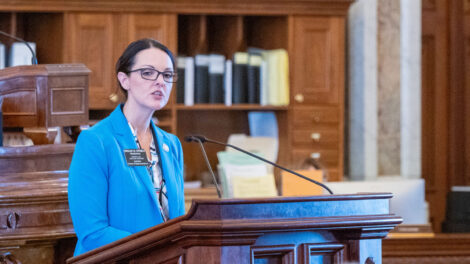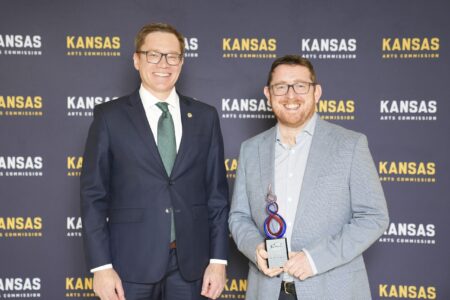Universities nearing rollout of required literacy classes for elementary teachers across the state
Come 2028 educators will need the classes to renew their teaching licenses

photo by: AdobeStock
Elementary schools across the state are about to get a large wave of new students — the teachers themselves.
More than 15,000 Kansas elementary school educators — everybody from teachers to counselors to principals — must get certified in new methods to teach reading to elementary students.
The stakes are high for teachers to get the new training: If they don’t complete the training — or pass a test showing they already know the material — they won’t get their teaching license renewed by the Kansas State Department of Education. The new licensing requirement begins in July 2028.
Of course, the stakes are also high for elementary students. Testing shows that more than 30% of Kansas elementary students read below their grade level, which has spurred the push for new teaching methods.
Now, KU and other public universities across the state are about to jump into the process in a big way. The University of Kansas, along with the other five Regents universities and Washburn University in Topeka, are scheduled to begin offering “science of reading” classes in June, a top official with the Kansas Board of Regents said this past week.
The college classes — totaling six credit hours — will be all about reading, specifically new methods that teachers can use to help Kansas students greatly improve their reading skills.
But teachers may want to be doing some math as they consider when to take the courses. The Kansas Legislature has provided $2.7 million this year to pay for the tuition associated with the new college courses. The Legislature also has agreed to pay a $500 stipend to each educator who completes the courses.
The money, though, comes with a catch that is common at the Kansas Statehouse: The Legislature and the governor must approve the funds each year, or else they disappear.
The leader of the state’s new Blueprint for Literacy program is hopeful that future Legislatures will renew the funding, but she’s not in a position to promise it.
“If they want us to pay for their tuition, they really should think about doing it now while we know the resources are here,” Cynthia Lane, director of the Blueprint for Literacy program, told the Journal-World in an interview.

photo by: Kansas Board of Regents
Cynthia Lane has been chosen to serve as the state’s first director of the Blueprint for Literacy program.
The Kansas Board of Regents on Wednesday set a $300-per-credit-hour tuition rate for the new science of reading program, which means the six-hour course would have a tuition price tag of $1,800.
At that rate, the state has enough money budgeted to pay for about 1,500 teachers to fully take the course during the next year. That’s a long way from 15,000, but the Blueprint for Literacy program isn’t the only way teachers can gain the needed certification. Since 2022, the Kansas Department of Education has been working with school districts to provide online training sessions, also at no cost to educators. Given the number of educators who have or currently are taking that training, Lane estimates that there are about 6,000 educators who still need to receive training before the new licensing requirements begin.
The training program is expected to be rigorous, but Lane said a benefit of the Blueprint for Literacy program is that it is designed entirely in Kansas for Kansas educators.
“It is uniquely tailored for Kansas educators,” Lane said.
But Lane said teachers should start planning for it. Using the science of reading method to teach literacy is significantly different than the methods many Kansas educators currently are using, she said. For example, the traditional method for teaching reading often encouraged students to skip a word that they had trouble with and instead use context clues to understand the sentence. The science of reading method rejects that approach and insists that teachers learn the details of phonics and how the brain really processes reading tasks.
Lane often compared the two methods to a snorkeler and a SCUBA diver. The first skims the surface exploring objects from a distance, while the latter dives deep to really examine an object.
“This approach requires us to teach kids deep skills,” Lane said. “Go deeper like a SCUBA diver so they understand phonics, they understand language and they read at a pace that allows them to understand what they are reading. The guessing game that you and I experienced, of guessing the words or skipping the words, that’s over.”
The new college course will be taught with a mixture of online and in-person classes, Lane said. She said it is likely that many textbook assignments will be conducted online, but that there will be a weekly classroom component where students — i.e. elementary educators — demonstrate that they are able to implement the lessons. Lane said the program also is being set up so that the college instructors can travel to the classrooms of elementary educators to help them implement the lessons with their elementary students.
That onsite coaching aspect is one reason why the Regents have set up the program to be taught across the state by all the Regents universities — KU, Kansas State, Emporia State, Fort Hays State, Pittsburg State, Wichita State and Washburn. Each of those schools will host a Center for Excellence in Reading where classes can be taught and where educators can go to get additional assistance with the concepts of the science of reading program.
KU hasn’t yet announced where its center will be located. It could be located on the Lawrence campus, but is not required to be located in Lawrence. Lane said locations for all the centers should become clear in the next 30 days or so.
The Kansas State Board of Education, which oversees all K-12 education in the state, is expected to consider giving final approval to the Blueprint for Literacy program at its March meeting, Lane said.
Then, individual universities will start marketing the new classes as they begin signing up students for the summer and fall semesters. Lane said she anticipates universities will offer the classes in a variety of schedules. Some may teach the classes in eight-week blocks, while other will hold to a typical semester schedule, which would mean an educator could have the training completed during one school year.
The program does include a component where teachers can take a test to demonstrate what skills and concepts they already have mastered. Based on the results of those tests, some teachers may not be required to take the full set of classes to receive the literacy certification.
How teachers will take the classes — will they only take them in the summer, will they try to take evening classes while teaching elementary classes — remains to be seen. Lane, who works for the Kansas Board of Regents, said she expects her office and universities will learn and adapt to what works best for the educators.
“We can be highly influenced by what the field wants,” Lane said.
Not every elementary teacher must receive the training. The Kansas State Department of Education website lists that teachers who exclusively teach art, physical education, health education, and music, for example, aren’t required to take the literacy training to renew their teaching licenses. However, several educators who aren’t primarily in the classroom will need to take the training to meet the new licensing requirements. Those include school principals and other such administrators, school psychologists and special education teachers.
All told, the program represents one of the largest changes ever to the state’s teacher licensing system. Lane said that the feedback from teachers has been “mixed” on the new requirements, but she thinks teachers will understand the benefits of the new literacy methods as they learn more about how they can help them day-to-day in the classroom.
“Teachers recognize the kids in their classroom who are struggling to read,” Lane said. “They recognize they are trying all of the tools they know, and that child is still struggling … So they are looking for what are the right tools, and that is what this course will help them with.”





